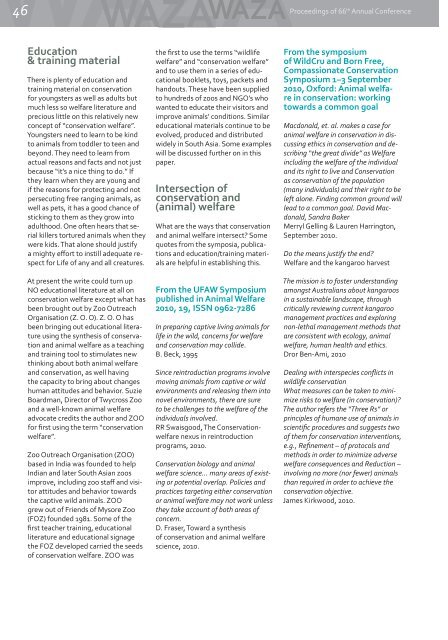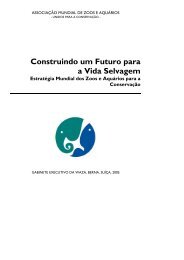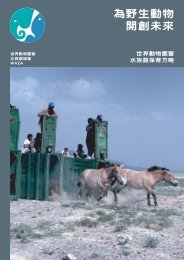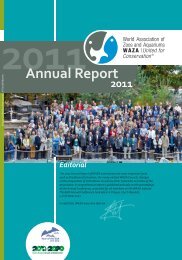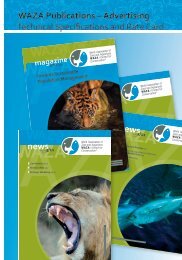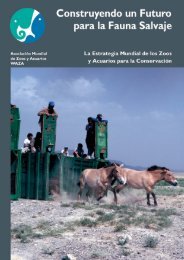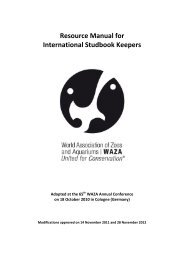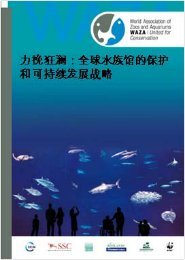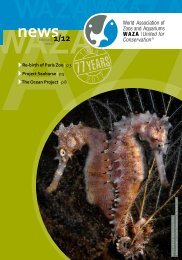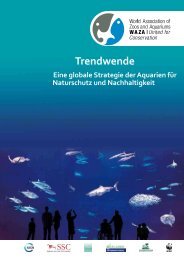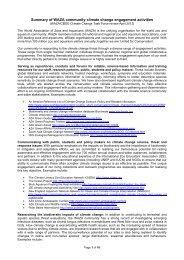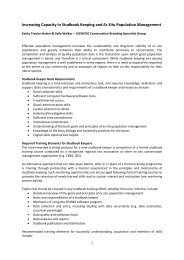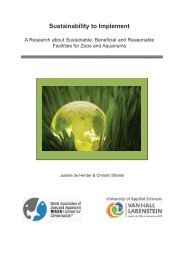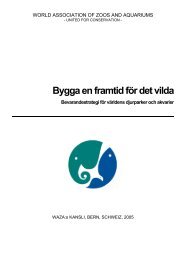Prague - WAZA
Prague - WAZA
Prague - WAZA
Create successful ePaper yourself
Turn your PDF publications into a flip-book with our unique Google optimized e-Paper software.
46<br />
Proceedings of 66 th Annual Conference<br />
Education<br />
& training material<br />
There is plenty of education and<br />
training material on conservation<br />
for youngsters as well as adults but<br />
much less so welfare literature and<br />
precious little on this relatively new<br />
concept of “conservation welfare”.<br />
Youngsters need to learn to be kind<br />
to animals from toddler to teen and<br />
beyond. They need to learn from<br />
actual reasons and facts and not just<br />
because “it’s a nice thing to do.” If<br />
they learn when they are young and<br />
if the reasons for protecting and not<br />
persecuting free ranging animals, as<br />
well as pets, it has a good chance of<br />
sticking to them as they grow into<br />
adulthood. One often hears that serial<br />
killers tortured animals when they<br />
were kids. That alone should justify<br />
a mighty effort to instill adequate respect<br />
for Life of any and all creatures.<br />
At present the write could turn up<br />
NO educational literature at all on<br />
conservation welfare except what has<br />
been brought out by Zoo Outreach<br />
Organisation (Z. O. O). Z. O. O has<br />
been bringing out educational literature<br />
using the synthesis of conservation<br />
and animal welfare as a teaching<br />
and training tool to stimulates new<br />
thinking about both animal welfare<br />
and conservation, as well having<br />
the capacity to bring about changes<br />
human attitudes and behavior. Suzie<br />
Boardman, Director of Twycross Zoo<br />
and a well-known animal welfare<br />
advocate credits the author and ZOO<br />
for first using the term “conservation<br />
welfare”.<br />
Zoo Outreach Organisation (ZOO)<br />
based in India was founded to help<br />
Indian and later South Asian zoos<br />
improve, including zoo staff and visitor<br />
attitudes and behavior towards<br />
the captive wild animals. ZOO<br />
grew out of Friends of Mysore Zoo<br />
(FOZ) founded 1981. Some of the<br />
first teacher training, educational<br />
literature and educational signage<br />
the FOZ developed carried the seeds<br />
of conservation welfare. ZOO was<br />
the first to use the terms “wildlife<br />
welfare” and “conservation welfare”<br />
and to use them in a series of educational<br />
booklets, toys, packets and<br />
handouts. These have been supplied<br />
to hundreds of zoos and NGO’s who<br />
wanted to educate their visitors and<br />
improve animals’ conditions. Similar<br />
educational materials continue to be<br />
evolved, produced and distributed<br />
widely in South Asia. Some examples<br />
will be discussed further on in this<br />
paper.<br />
Intersection of<br />
conservation and<br />
(animal) welfare<br />
What are the ways that conservation<br />
and animal welfare intersect? Some<br />
quotes from the symposia, publications<br />
and education/training materials<br />
are helpful in establishing this.<br />
From the UFAW Symposium<br />
published in Animal Welfare<br />
2010, 19, ISSN 0962-7286<br />
In preparing captive living animals for<br />
life in the wild, concerns for welfare<br />
and conservation may collide.<br />
B. Beck, 1995<br />
Since reintroduction programs involve<br />
moving animals from captive or wild<br />
environments and releasing them into<br />
novel environments, there are sure<br />
to be challenges to the welfare of the<br />
individuals involved.<br />
RR Swaisgood, The Conservationwelfare<br />
nexus in reintroduction<br />
programs, 2010.<br />
Conservation biology and animal<br />
welfare science… many areas of existing<br />
or potential overlap. Policies and<br />
practices targeting either conservation<br />
or animal welfare may not work unless<br />
they take account of both areas of<br />
concern.<br />
D. Fraser, Toward a synthesis<br />
of conservation and animal welfare<br />
science, 2010.<br />
From the symposium<br />
of WildCru and Born Free,<br />
Compassionate Conservation<br />
Symposium 1–3 September<br />
2010, Oxford: Animal welfare<br />
in conservation: working<br />
towards a common goal<br />
Macdonald, et. al. makes a case for<br />
animal welfare in conservation in discussing<br />
ethics in conservation and describing<br />
“the great divide” as Welfare<br />
including the welfare of the individual<br />
and its right to live and Conservation<br />
as conservation of the population<br />
(many individuals) and their right to be<br />
left alone. Finding common ground will<br />
lead to a common goal. David Macdonald,<br />
Sandra Baker<br />
Merryl Gelling & Lauren Harrington,<br />
September 2010.<br />
Do the means justify the end?<br />
Welfare and the kangaroo harvest<br />
The mission is to foster understanding<br />
amongst Australians about kangaroos<br />
in a sustainable landscape, through<br />
critically reviewing current kangaroo<br />
management practices and exploring<br />
non-lethal management methods that<br />
are consistent with ecology, animal<br />
welfare, human health and ethics.<br />
Dror Ben-Ami, 2010<br />
Dealing with interspecies conflicts in<br />
wildlife conservation<br />
What measures can be taken to minimize<br />
risks to welfare (in conservation)?<br />
The author refers the “Three Rs” or<br />
principles of humane use of animals in<br />
scientific procedures and suggests two<br />
of them for conservation interventions,<br />
e.g., Refinement – of protocols and<br />
methods in order to minimize adverse<br />
welfare consequences and Reduction –<br />
involving no more (nor fewer) animals<br />
than required in order to achieve the<br />
conservation objective.<br />
James Kirkwood, 2010.


